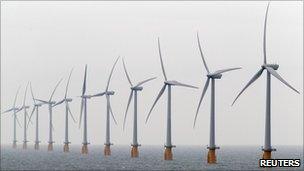Salmond concerned over new UK energy plan
- Published

Alex Salmond is worried renewable projects may be disadvantaged
Scotland's first minister has denounced UK government plans to help the energy industry build a new generation of nuclear power plants.
Alex Salmond said the subsidies for nuclear energy in England could be at the expense of renewables in Scotland.
The comments came in response to UK Energy Secretary Chris Huhne's plan for a new pricing regime to help the industry replace ageing power stations.
His recommendations will go out to public consultation.
Many of Britain's power stations are due to be unplugged in the next decade, and the grid needs upgraded.
Mr Huhne, in his Energy Market Reform statement to Westminster, set out price floors for energy to provide reliable income streams with which businesses can more easily invest.
He ruled out coal, unless its emissions are trapped and buried.
Mr Huhne also wants companies to build power plants as back-up when wind turbines stop turning.
He said his proposals were fourfold:
to increase the long-term certainty about investment in power generation by providing greater support to the price of carbon to encourage new entrants into the market
to introduce long-term contracts for low carbon generation to make clean energy more attractive, including top up payments to low carbon generators if the wholesale price of electricity is low
to make additional payments to develop reserve plants to ensure "the lights stay on" during periods of high demand
to limit the amount of carbon emissions from "dirty" power stations, including reinforcing current requirements that new coal power stations must incorporate carbon capture and storage.
The cost of the changes mean household and business bills rising, perhaps by a quarter over a decade.
It also means controversy about the energy mix.
The proposed pricing is skewed to support power plants that cut the need for carbon emissions, including renewable turbines and new nuclear plants.
Mr Salmond said that was "deeply unwelcome", and that the Scottish government would "resist in the strongest possible terms" what he called subsidies for nuclear in England.
The first minister wrote an open letter to energy companies and industry representatives with the Scottish government's initial views.
He said: "With the highest renewables targets and the best energy potential in the UK, we need a framework that fully delivers all that Scotland can offer. That means better regulation and an end to the current inbuilt discrimination against Scotland in transmission charging.
"We have used the levers available to us to create a strong and innovative framework with the best levels of support in the UK for wind, wave and tidal energy development.
"Against that successful track record, change could unnecessarily risk investor confidence and could have significant ramifications for our energy industry. Scotland's powers to target support to our unique Scottish opportunities has been key and must be maintained or enhanced."
He added: "Our clear position against new nuclear power is supported by parliament and by the people and we will resist in the strongest possible terms any change that would see subsidies for new nuclear power in England and Wales at the expense of renewable electricity and carbon capture and storage in Scotland."
A spokesman for ScottishPower said the proposals represented "an important milestone" on the road to securing the investment for lower carbon power. It said details have yet to be worked out, but it wanted to keep consumer interest in mind.
Ian Marchant, chief executive of Scottish and Southern Energy, welcomed the protection for existing investments.
He said: "In the next two decades, substantial investment is needed to decarbonise the power sector and maintain security of supply whilst ensuring electricity remains affordable.
"The process needs to deliver a framework which encourages delivery of all of the key generation technologies needed over the next two decades - renewables, thermally-efficient gas-fired power stations, nuclear and carbon capture and storage"
At wildlife campaign group WWF Scotland, Sam Gardner argued support for nuclear power would be a "huge step backward".